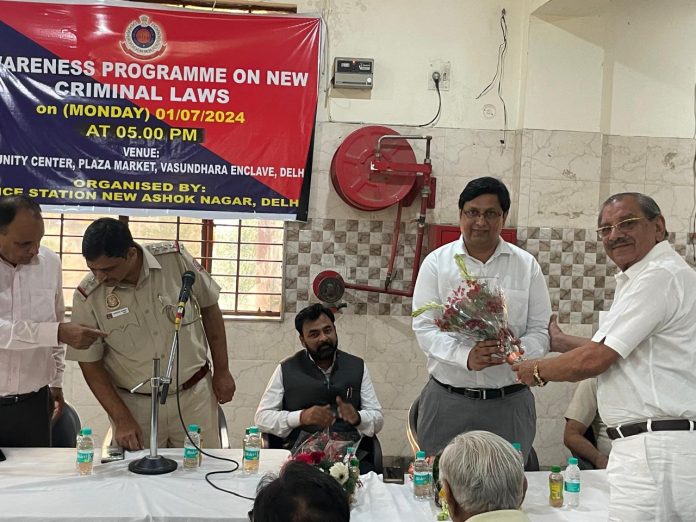New Delhi, July 2: As part of a series of awareness programs organized by the Delhi Police, Supreme Court Advocate Aslam Ahmed, Partner at Singhania and Co., addressed the public on the newly enforced criminal laws on July 1, 2024. The programs, held at various locations, aimed to educate citizens about the Bhartiya Nagrik Suraksha Samhita 2023 (replacing the CrPC 1973), the Bhartiya Nyay Samhita 2023 (replacing the IPC 1860), and the Bhartiya Sakshaya Adhiniyam 2023 (replacing the IEA 1872).
The events were attended by members of various Resident Welfare Associations in Delhi, school students, social workers, and Delhi police officers. At the New Ashok Nagar and Gazipur police stations, Aslam Ahmed delivered talks emphasizing the positive changes introduced by the new laws.
Ahmed highlighted several key aspects of the new enactments, including a three-year deadline for trials, new definitions of bail and bail bond, and provisions addressing organized crime and terrorism. Procedural advancements include provisions for bail after serving one-third of a sentence, zero FIR, E-FIR, and special considerations for women, along with measures to discourage false FIRs. He noted that the provision for negligent driving causing death is not yet in force, and that proclaimed offenders can now be tried.
However, Ahmed pointed out potential concerns regarding civil rights, such as the extended police custody period and the relatively strict bail provisions, which could be seen as contrary to the principle of “innocent until proven guilty.”
Overall, Ahmed described the new laws as progressive steps towards integrating modern developments and technology into the legal system, particularly through the use of forensic science and videography in evidence collection.
The programs received support and participation from Delhi Police, Ryan School, the Joint Forum of Vasundhara Enclave, and various RWAs, all of whom were instrumental in raising awareness about the new laws.
Ahmed concluded by acknowledging that while the new laws are a significant step forward, the old laws will still apply to offenses committed prior to the enactments. He emphasized the importance of continued learning and adaptation as the legal landscape evolves over the coming years.




